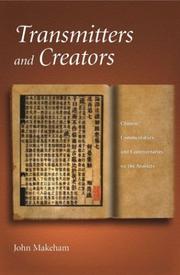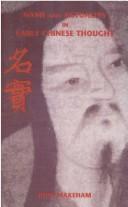| Listing 1 - 10 of 19 | << page >> |
Sort by
|
Book
ISBN: 9789048129294 9789048129300 9789048129317 9789400732698 9400732694 Year: 2010 Volume: 1 Publisher: Dordrecht: Springer,
Abstract | Keywords | Export | Availability | Bookmark
 Loading...
Loading...Choose an application
- Reference Manager
- EndNote
- RefWorks (Direct export to RefWorks)
This Companion is the first volume to provide a comprehensive introduction, in accessible English, to the Neo-Confucian philosophical thought of representative Chinese thinkers from the eleventh to the eighteenth centuries. It brings together nineteen essays on a range of topics in Neo-Confucian philosophy, embracing natural and speculative philosophy through to virtue ethics and political philosophy. Written for undergraduate and postgraduate university students in philosophy and Chinese history courses, as well as academics, the Companion is distinguished by several features: It demonstrates the key role played by philosophical discourse in Neo-Confucian self-cultivation; it evidences the fundamental connections that were posited between morality in human society and its cosmological and ontological underpinnings; and it provides detailed insights into changing perspectives on key philosophical concepts and their relationship with one another.
Philosophy --- Taoisme --- Confucius --- Neo-Confucianism

ISBN: 067401216X 1684173906 9780674012165 9781684173907 Year: 2003 Volume: 228 Publisher: Boston Leiden;Boston Harvard University Asia Center BRILL
Abstract | Keywords | Export | Availability | Bookmark
 Loading...
Loading...Choose an application
- Reference Manager
- EndNote
- RefWorks (Direct export to RefWorks)
Confucius. --- S12/0363 --- China: Philosophy and Classics--Lunyu 論語 Analects --- Konfuzius --- K'oeng Foe-tse --- Kung-foo-tsze --- Kung-Kew --- Kong-Fou-Tze --- Kʻung, Chʻiu --- Kwan-Foo-Tze --- Kung-tse --- Konfut︠s︡ius --- Konfut︠s︡iĭ --- Kʻung, Fu-tzu --- Kʻung Fu-tzu --- Kongja --- Khong Tju --- Kōshi --- Kʻung-tzu --- Kungfutse --- Confucio --- Kongzi --- Khong Čhư̄ --- Khongčhư̄ --- Kan̲pūciyas --- Kong fu zi --- 孔丘 --- 孔夫子 --- 孔子 --- 공자 --- Kung tzu --- Confucius --- Confucius. - Lun yu. --- Philosophy, Chinese
Book
ISBN: 904812929X 9786613002884 1280000074 9048129303 Year: 2010 Publisher: New York : Springer,
Abstract | Keywords | Export | Availability | Bookmark
 Loading...
Loading...Choose an application
- Reference Manager
- EndNote
- RefWorks (Direct export to RefWorks)
This Companion is the first volume to provide a comprehensive introduction, in accessible English, to the Neo-Confucian philosophical thought of representative Chinese thinkers from the eleventh to the eighteenth centuries. It brings together nineteen essays on a range of topics in Neo-Confucian philosophy, embracing natural and speculative philosophy through to virtue ethics and political philosophy. Written for undergraduate and postgraduate university students in philosophy and Chinese history courses, as well as academics, the Companion is distinguished by several features: It demonstrates the key role played by philosophical discourse in Neo-Confucian self-cultivation; it evidences the fundamental connections that were posited between morality in human society and its cosmological and ontological underpinnings; and it provides detailed insights into changing perspectives on key philosophical concepts and their relationship with one another.
Neo-Confucianism. --- Philosophy, Chinese -- 20th century. --- Neo-Confucianism --- Philosophy & Religion --- Philosophy --- Philosophy, Chinese. --- Chinese philosophy --- Philosophy. --- Religion. --- Culture --- Religion --- Philosophy, Asian. --- Non-Western Philosophy. --- Religious Studies, general. --- Philosophy of Religion. --- History of Philosophy. --- Regional and Cultural Studies. --- Study and teaching. --- Confucianism --- Philosophy, Chinese --- Philosophy (General). --- Culture-Study and teaching. --- Mental philosophy --- Humanities --- Religion, Primitive --- Atheism --- God --- Irreligion --- Religions --- Theology --- Asian philosophy --- Oriental philosophy --- Philosophy, Oriental --- Religion—Philosophy. --- Culture—Study and teaching. --- Philosophy, Modern. --- Ethnology. --- Culture. --- Philosophical Traditions. --- Regional Cultural Studies. --- History. --- Cultural sociology --- Sociology of culture --- Civilization --- Popular culture --- Cultural anthropology --- Ethnography --- Races of man --- Social anthropology --- Anthropology --- Human beings --- Modern philosophy --- Social aspects

ISBN: 0791419843 0791419835 9780791419830 9780791419847 Year: 1994 Publisher: Albany State university of New York press
Abstract | Keywords | Export | Availability | Bookmark
 Loading...
Loading...Choose an application
- Reference Manager
- EndNote
- RefWorks (Direct export to RefWorks)
S12/0224 --- S12/0210 --- China: Philosophy and Classics--Chinese philosophy: Han --- China: Philosophy and Classics--Special philosophical subjects --- Philosophie --- Philosophie. --- Philosophy, Chinese --- Philosophy, Chinese. --- Taalfilosofie. --- philosophie chinoise --- vie intellectuelle --- vie sociale --- 960 --- 220 --- Xu, Gan, --- Xu, Gan. --- Critique et interprétation. --- Criticism and interpretation. --- 221 B.C.-960 A.D. --- Geschichte 221 v. Chr.-960. --- China. --- Hsü, Kan, --- Xu, Weichang, --- Hsü, Wei-chʻang, --- 徐干, --- 徐幹,
Book
ISBN: 9780190878559 019087855X 0190878584 0190878576 Year: 2018 Publisher: New York Oxford University Press
Abstract | Keywords | Export | Availability | Bookmark
 Loading...
Loading...Choose an application
- Reference Manager
- EndNote
- RefWorks (Direct export to RefWorks)
Buddhism --- Buddhist philosophy. --- Neo-Confucianism. --- Doctrines --- Doctrines. --- Zhu, Xi, --- China. --- Neo-Confucianism --- Buddhist philosophy --- Philosophy, Buddhist --- Philosophy --- Buddhism and philosophy --- Confucianism --- Philosophy, Chinese --- Chu, Hsi, --- C̄ū, Hī, --- Chu, Hi, --- Choo, He, --- Tschu, Hi, --- Shu, Ki, --- Chu, Hy, --- Tchou, Hi, --- Chu, Hũi, --- Tchu-hi, --- 朱熹, --- Zhu, Fuzi, --- Chu, Fu-tzu, --- Choo-Foo-Tze, --- Choo-foo-tsze, --- Chu, Puja, --- 朱夫子, --- Zhu, Zi, --- Chu, Tzu, --- Zhuzi, --- Chu-tzu, --- Chuja, --- Shu-shi, --- Shushi, --- 朱子, --- Zhu, Yuanhui, --- Chu, Yüan-hui, --- 朱元晦, --- Zhu, Zhonghui, --- Chu, Chung-hui, --- 朱仲晦, --- Zhu, Hui'an, --- Chu, Hui-an, --- 朱晦庵, --- Zhu, Huiweng, --- Chu, Hui-weng, --- 朱晦翁, --- Zhu, Dunweng, --- Chu, Tun-weng, --- 朱遯翁, --- Yungulaoren, --- Yün-ku-lao-jen, --- 云谷老人, --- Cangzhoubingsou, --- Tsʻang-chou-ping-sou, --- 沧洲病叟, --- Zhu, Ziyang, --- Chu, Tzu-yang, --- 朱紫陽, --- 朱紫阳, --- S12/0433 --- S13A/0345 --- China: Philosophy and Classics--Zhu Xi --- China: Religion--Chinese Buddhism: philosophy and theory --- Chu, Hsi --- C̄ū, Hī --- Chu, Hi --- Choo, He --- Tschu, Hi --- Shu, Ki --- Chu, Hy --- Tchou, Hi --- Chu, Hũi --- Tchu-hi --- 朱熹
Book
ISBN: 9789629964788 9629964783 Year: 2012 Publisher: Hong Kong : ©2012 The Chinese University Press,
Abstract | Keywords | Export | Availability | Bookmark
 Loading...
Loading...Choose an application
- Reference Manager
- EndNote
- RefWorks (Direct export to RefWorks)
Learning to Emulate the Wise is the first book of a three-volume series that constructs a historically informed, multidisciplinary framework to examine how traditional Chinese knowledge systems and grammars of knowledge construction interacted with Western paradigms in the formation and development of modern academic disciplines in China. In the first book of its kind in English, John Makeham and several other noted sinologists and explore how the field of "Chinese philosophy" (Zhongguo zhexue), developed in the early decades of the twentieth century, exploring the field's growth and relationship with European, American, and Japanese scholarship and philosophy. The volume discusses an array of representative individuals and institutions, including Nishi Amane, Hu Shi, Zhang Taiyan, Liang Shuming, Xiong Shili, Tang Yongtong, Feng Youlan, Jin Yuelin, and a range of Marxist philosophers. The epilogue concludes by discussing the intellectual-historical significance of these figures and throws into relief how Zhongguo zhexue is understood today.
Book
ISBN: 9780199358137 9780199358120 Year: 2014 Publisher: New York Oxford university press
Abstract | Keywords | Export | Availability | Bookmark
 Loading...
Loading...Choose an application
- Reference Manager
- EndNote
- RefWorks (Direct export to RefWorks)
Yogācāra (Buddhism) --- Philosophy, Chinese. --- China --- Civilization. --- S13A/0315 --- China: Religion--Chinese Buddhism: sects: general

ISBN: 0585044945 9780585044941 0791419835 0791419843 143841174X Year: 1994 Publisher: Albany State University of New York Press
Abstract | Keywords | Export | Availability | Bookmark
 Loading...
Loading...Choose an application
- Reference Manager
- EndNote
- RefWorks (Direct export to RefWorks)
Philosophy, Chinese --- Philosophy --- Philosophy & Religion --- Xu, Gan, --- Hsü, Kan, --- Xu, Weichang, --- Hsü, Wei-chʻang, --- 徐幹, --- 徐干, --- Criticism and interpretation.
Book
ISBN: 9629969009 9789629969004 9789629964788 9629964783 Year: 2012 Publisher: Hong Kong : Baltimore, Md. : The Chinese University Press, Project MUSE,
Abstract | Keywords | Export | Availability | Bookmark
 Loading...
Loading...Choose an application
- Reference Manager
- EndNote
- RefWorks (Direct export to RefWorks)
Book
ISBN: 9789004471238 9004471235 9789004471245 9004471243 Year: 2021 Publisher: Leiden;Boston BRILL
Abstract | Keywords | Export | Availability | Bookmark
 Loading...
Loading...Choose an application
- Reference Manager
- EndNote
- RefWorks (Direct export to RefWorks)
This innovative volume demonstrates how and to what ends the writings of Xiong Shili, Ma Yifu, Tang Junyi and Mou Zongsan adopted and repurposed conceptual models derived from the Buddhist text Treatise on Awakening Mahāyāna Faith. It shows which of the philosophical positions defended by these New Confucian philosophers were developed and sustained through engagement with the critical challenges advanced by scholars who attacked the Treatise. It also examines the extent to which twentieth-century New Confucians were aware of their intellectual debt to the Treatise and explains how they reconciled this awareness with their Confucian identity.
Mahayana Buddhism. --- Philosophy, Confucian. --- Dasheng qixin lun. --- Mahayana Buddhism --- Philosophy, Confucian --- Confucian philosophy --- Confucianism --- Philosophy, Chinese --- Greater vehicle --- Northern Buddhism --- Northern vehicle --- Buddhism --- Buddhist sects
| Listing 1 - 10 of 19 | << page >> |
Sort by
|

 Search
Search Feedback
Feedback About UniCat
About UniCat  Help
Help News
News